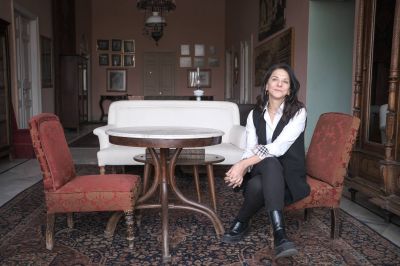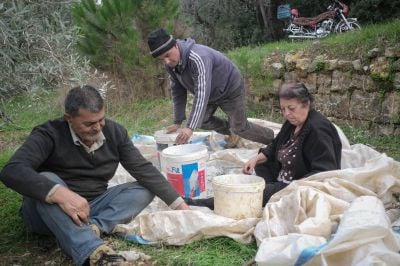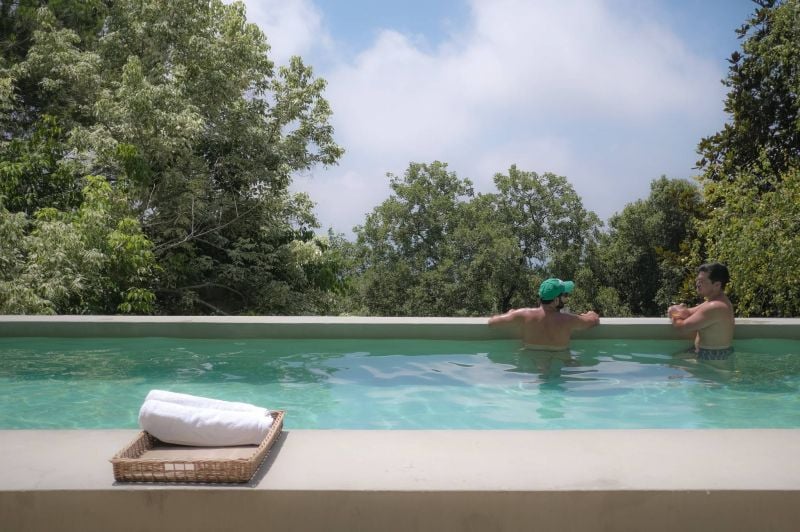
The pool at the Beit Trad guesthouse in Kfour, Kesrouan. July 21, 2023. (Credit: João Sousa/L'Orient Today)
KFOUR, Kesrouan – Smooth jazz wafts through an airy dining room on a steamy mid-July day in the hills above Jounieh. Sometime after noon, sun-kissed couples in swim coverups line up to scoop salads onto delftware plates, beneath a 17th-century Mughal tapestry of geometric pomegranates.
If that already sounds impossibly lush, just wait to see the rest of Beit Trad – the crème de la crème of boutique Lebanese guesthouses. Starting at $280 per night, Beit Trad has a pool, in-room massage services and decades of avant-garde antiques collected by the owners. There’s also – some of the guests explain with a smile – a no-children policy.
Opened in 2018, Beit Trad is part of a growing countrywide trend toward family-run, boutique guesthouses. Most are in rural areas. And instead of hulking, modern(ish) towers, many – like Beit Trad – operate within the countryside’s historic stone-and-arch-windowed family estates, retrofitted and re-styled to host 21st-century guests with cash to spare.
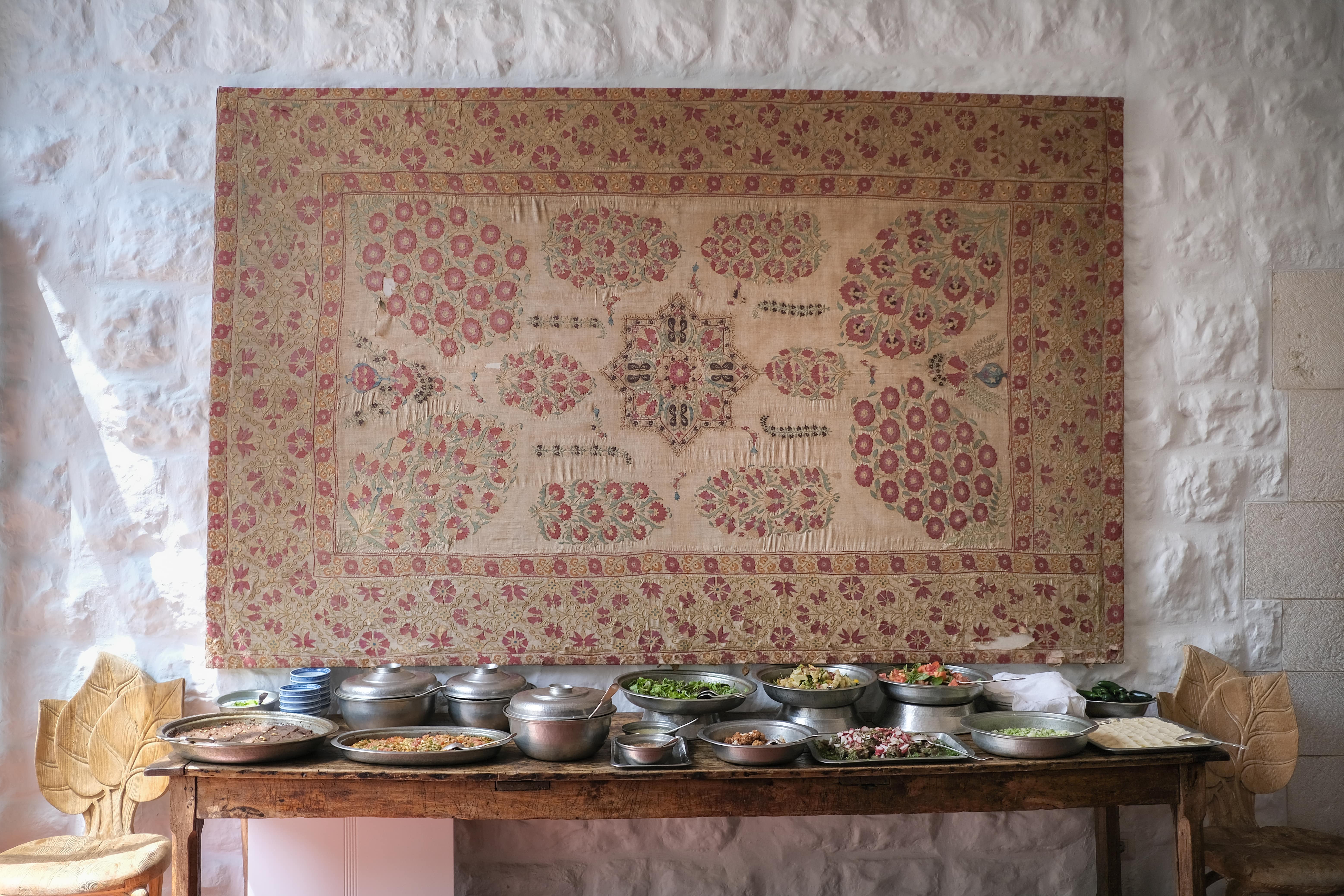 The dining room at the Beit Trad guesthouse in Kfour, Kesrouan. July 21, 2023. (Credit: João Sousa/L'Orient Today)
The dining room at the Beit Trad guesthouse in Kfour, Kesrouan. July 21, 2023. (Credit: João Sousa/L'Orient Today)
The luxe properties are a far cry from the electricity cuts and daily indignities of life for the majority of Lebanese, thrust into poverty since 2019 by the economic crisis.
And yet, Pierre Achkar, the president of the Hotel Owners’ Syndicate, figures dozens of new guesthouses have opened around the country since the COVID pandemic and Lebanon’s economic downturn, as urbanites who could still afford a weekend away looked for pastoral countryside escapes.
But Achkar isn’t in charge of the guesthouses – instead, those have become so popular that guesthouse owners launched their own, separate, professional syndicate last month, a move to start regularizing an industry they say is much different from running a big hotel or resort.
“Most of us are amateurs,” says Sarah Trad, the owner of Beit Trad in Kfour. Built in stages from the 1700s to today, the sprawling limestone house has belonged to her family since the 1980s, when they bought it as a mountain haven during the civil war years. In 2013, she began converting the property into a guesthouse “to keep life in the building,” she says.
“We’re not hotels; we don’t have the same rules or ethos. It’s a different beast,” Trad says.
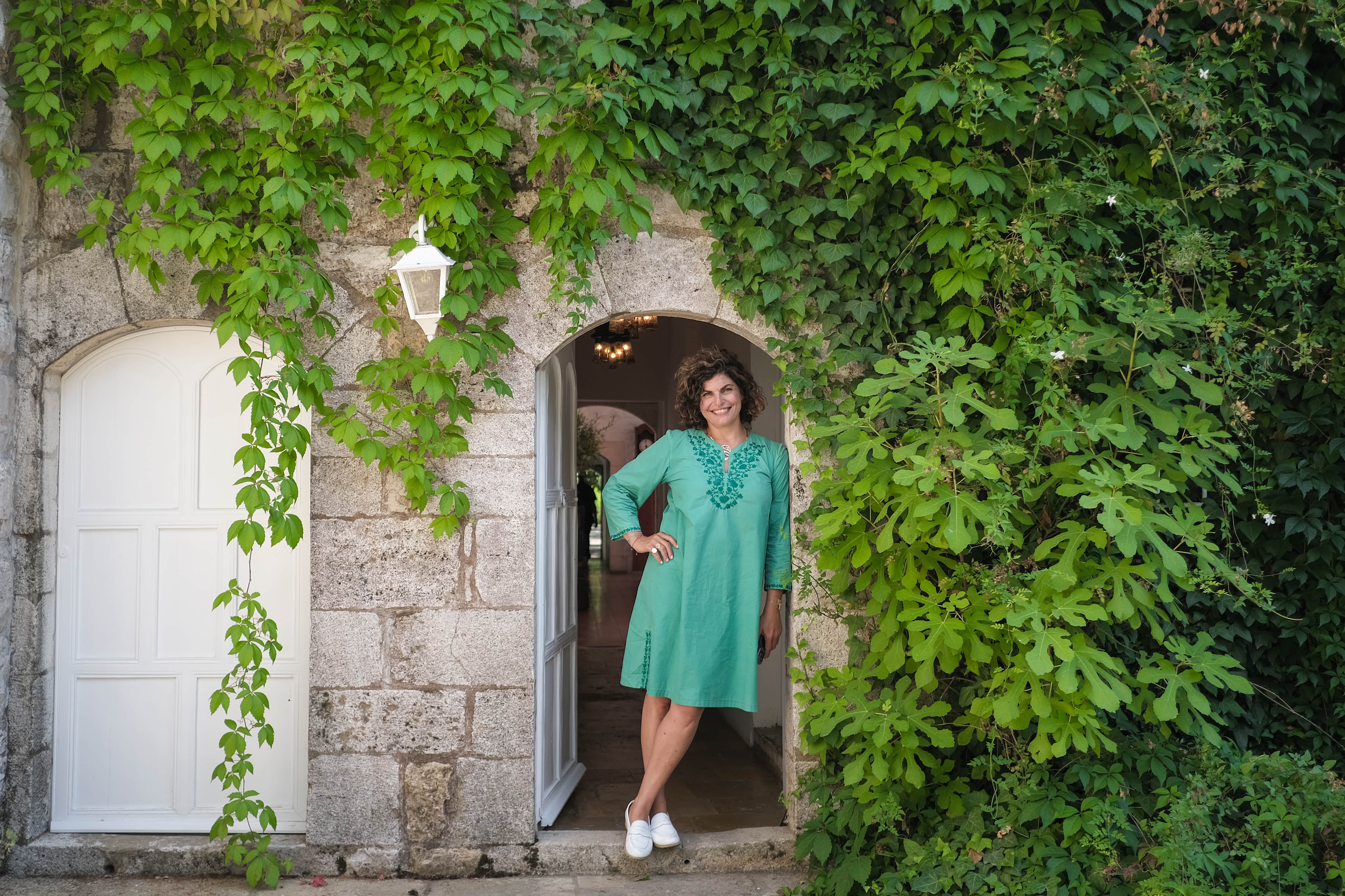 Sarah Trad, owner of the Beit Trad guesthouse in Kfour, Kesrouan. July 21, 2023. (Credit: João Sousa/L'Orient Today)
Sarah Trad, owner of the Beit Trad guesthouse in Kfour, Kesrouan. July 21, 2023. (Credit: João Sousa/L'Orient Today)
Many of Trad’s repeat customers have become friends, she explains while handing guests their lunch plates and taking drink orders. She has a general manager on staff, and already has a full-time job as president of a local NGO, yet Trad floats through the house all afternoon playing host.
Summer is her busiest season, she says, and today is “fully booked.”
A new syndicate
Rooms are also packed at Bkerzay, which owner Ramzi Salman describes as a “guesthouse village” of 29 traditional-style stone villas in the Chouf mountains.
One group of about three dozen guests gathers on the restaurant terrace for a baptism celebration, while a few families drink from a bar stationed at the infinity pool. Under the restaurant, three workers spin and fire pottery for the gift shop.
Since last month, Salman serves as president of the newly launched guesthouse owners’ syndicate, after the Tourism Ministry helped set it up and facilitate the election.
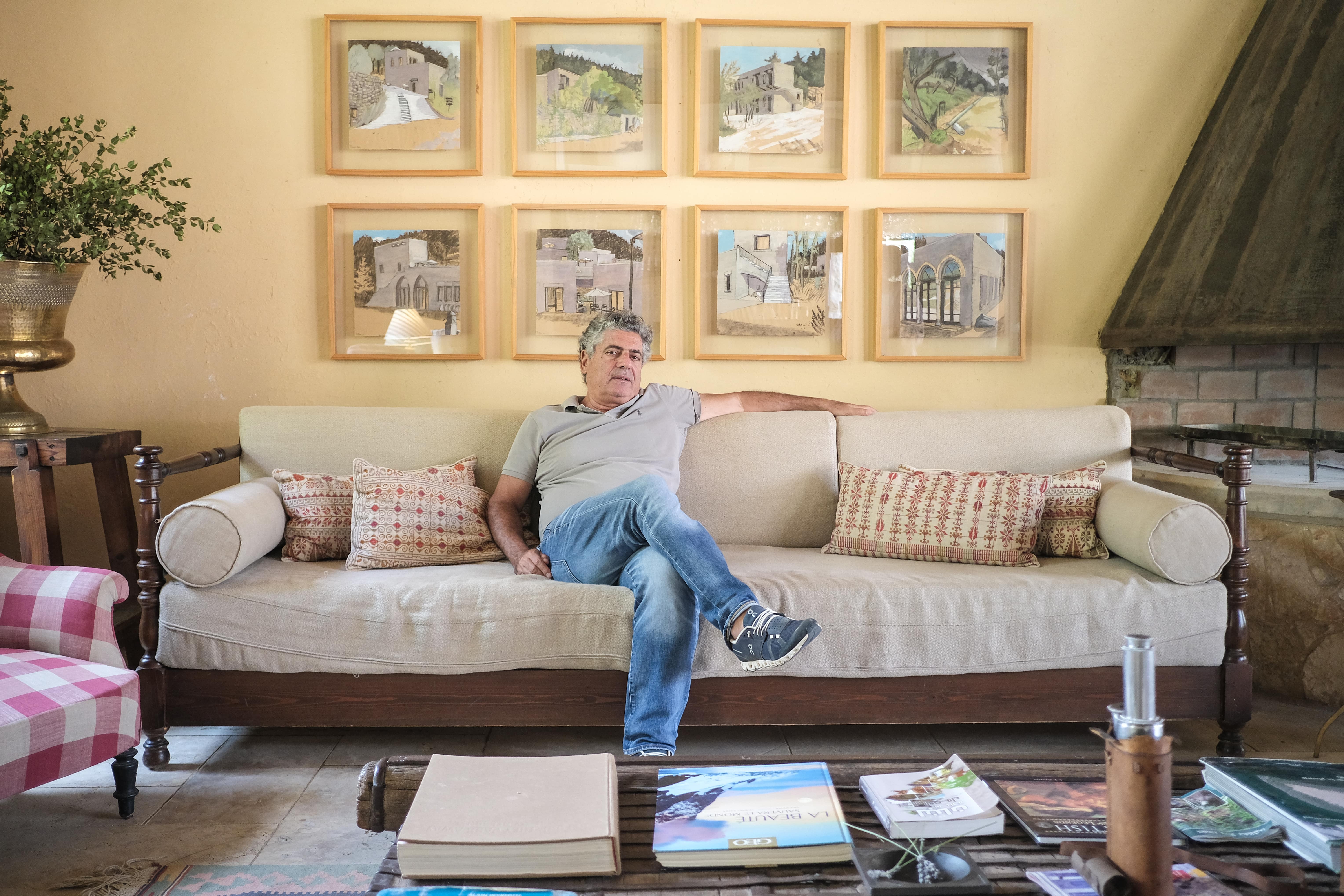 Ramzi Salman, head of the newly established guesthouse owners' syndicate, and owner of the Bkerzay "guesthouse village" in the Chouf mountains. July 29, 2023. (Credit: João Sousa/L'Orient Today)
Ramzi Salman, head of the newly established guesthouse owners' syndicate, and owner of the Bkerzay "guesthouse village" in the Chouf mountains. July 29, 2023. (Credit: João Sousa/L'Orient Today)
Salman’s first task, he says is to survey guesthouses across Lebanon to compile a reliable database.
That’s because, despite their popularity, there are still no precise statistics on the number of guesthouses in the country. Some are simply private “family homes” with extra rooms offered up for travelers, Salman explains, while others are fully fledged businesses with dozens of waiters, cleaners and massage therapists on staff, like at his “guesthouse village” in Bkerzay.
His best guess is that there are “more than 200” guesthouses in Lebanon, though most are the informal ones run by families.
How many have joined the syndicate so far? “Zero,” Salman says, “We just started.”
But that could change soon after the planned guesthouse database launches – which he hopes will be ready within six months — and could help guesthouse owners drum up bookings and revenue.
 Lunch and dessert at the Beit Trad guesthouse in Kfour, Kesrouan. July 21, 2023. (Credit: João Sousa/L'Orient Today)
Lunch and dessert at the Beit Trad guesthouse in Kfour, Kesrouan. July 21, 2023. (Credit: João Sousa/L'Orient Today)
“It’s a new sector, and it’s growing in a viral manner,” according to Salman. At his own Bkerzay property, he says revenue is up 26 percent compared to last summer. Trad, too, says her sales this year are up.
That growth is in line with observations by the Tourism Ministry, which earlier this year surveyed 150 guesthouses across the country, says Sareen Amar, Head of Hotels and Accomodation at the ministry.
Since 2011, when the ministry issued the first decree to formally define and regularize guesthouses, more people have begun to invest in them, though there isn’t data yet on total yearly revenue.
“Of course” more people are catching on to the idea, Amar adds, especially in remote regions outside main cities, where families are looking for added income and where tourists – including those from the Lebanese diaspora – want to search for a sense of “authentic” culture.

‘La la land’
That appeal has taken on new meaning amid the traumas of recent years, from the port blast in 2020 to a spiraling economic crisis. One recent study by Human Rights Watch found a majority of people in Lebanon were no longer able to afford basic needs such as heating, clothing and school costs. Some have cut back on meals.
But for the privileged few who can afford them, rural guesthouses offer something of a reprieve.
In the days after the Aug. 4 blast, Sarah Trad says she left her home in Hazmieh, just south of Beirut, and came up to Beit Trad for some rest. “It was like a la la land away from my city that just exploded. I was ready to kill the music, kill the business. For three days everything was quiet.”
To her shock, after several days, clients started booking rooms again. Some had broken arms. One brought a nurse to tend to their wounded eye all evening.
“And I remember one night, I came back to the house, and it was dark with all candlelight, and I saw that at every single table, someone was injured,” she recounts. A speaker bolted to the ceiling plays some soft piano music over the clinking of guests’ lunchtime silverware.
“They just wanted some peace and quiet. Some of them said it was the first time they had gotten sleep in days… It’s like, ‘get me out of this horrible reality.’”
Sometime after lunch, in an hour or so, Trad will vanish and rematerialize, barefoot and swimsuit-clad, from one of the guesthouse’s back rooms. She’ll join her guests in the small pool out front, where they’ll drink glistening mulberry syrups and read paperbacks in French. A huge fluffy dog will appear from some unseen corner of the property and nap next to a young couple suntanning poolside. Tucked away in the kitchen, workers will pipe jam into freshly baked sugar cookies.
“I realized that la la lands are important,” Trad says.
 Poolside at the Beit Trad guesthouse in Kfour, Kesrouan. July 21, 2023. (Credit: João Sousa/L'Orient Today)
Poolside at the Beit Trad guesthouse in Kfour, Kesrouan. July 21, 2023. (Credit: João Sousa/L'Orient Today)
